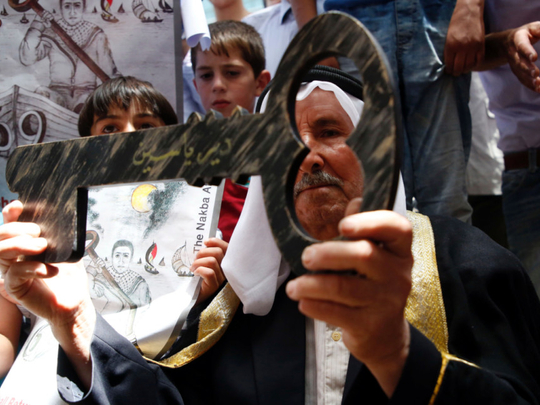
‘The suffering of the Palestinian people in Gaza Strip and the West Bank is indescribable due to the practices of the Occupation [Israel] and its continued and unprecedented violations. Internally, the Palestinian division on a political and geographic level grows deeper despite the difficult circumstances and plots that target our people and their just cause. Instead of working on unifying their ranks to face challenges, we see both parties exchange accusations, and the only one that benefits from all this is the Occupation, which is harnessing all efforts to thwart Palestinian attempts to unite,” wrote Lebanon’s Daily Star.
“On an external level, Arab nations, some of whom the Palestinians counted on, are suffering from domestic conflicts, especially after the appearance of Daesh [the self-proclaimed Islamic State of Iraq and the Levant] and similar groups. This made them more distant from the central Arab issue as their priority now lies in combating terrorism and solving their domestic matters,” the paper added. “Today, there are 12.7 million Palestinians worldwide — a nine-fold increase since the 1948 Nakba — and nearly six million of these rely on UNRWA [United Nations Relief and Works Agency for Palestine] for daily support. As the years pass by, Palestinians’ dreams of returning home and liberating their homelands have been shattered. And when their lives are not made insufferable by the Israelis themselves, they have been drawn into conflicts — both political and military — in Arab countries that host them. This anniversary comes at a bleak time for the region, with conflicts raging, tearing people apart on sectarian and ethnic lines and leaving hundreds of thousands dead. And with the Palestinians left to fend for themselves, the Zionists have never had a better opportunity to take advantage and deprive people of rights and land.”
Meanwhile, whoever is following the Iranian election feels the magnitude of the country’s domestic catastrophes as poverty and unemployment spread, and wars become an alternative to Iran’s own development, said the UAE’s Al Bayan.
“This is what once could call the suicide of a country, under the weight of its blind and bloody regional expansion machinations that are attempting to deflect the attention from what is really occurring in the country. There are disparities in numbers pertaining to how much Iran has spent on its interferences in the Arab world, from the time of the Iraqi-Iranian war up to military intervention in Arab countries, as well as support for a number of organisations, parties and regimes. Some estimates are astronomical, touching on thousands of billions of dollars, while other estimate it to be less. What is certain, however, is that Tehran is wasting its people’s wealth on regional wars that have nothing to do with themselves.”
The Iranian regime has always meant to undermine the region’s security and stability, wrote Saudi Arabia’s Al Yaum.
“The citizens of Saudi Arabia, Bahrain and Kuwait possibly still remember the series of brutal terrorist attacks in their countries, which were planned by Iran. The criminals who perpetrated those attacks confessed that they committed those destructive acts because they were paid and armed by the Iranian regime to shake up the stability of those countries. The entire world is now aware that the Iranian regime is determined to disrupt the security and stability of the Gulf and Arab nations, and to spread sectarian ideologies and methods of extremism in these countries. It is no longer a secret that Iran is a driving force for disorders, bloodshed and the spread of militias in the region.”




_resources1_16a31069e4e_small.jpg)





